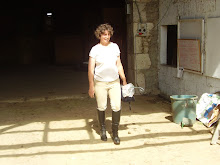In TPRS the
teachers prefer surprise tests, in order to measure what has been acquired and
not what the student has memorized the night before. But I teach in France where students, not to
mention my colleagues and the administration, would not take me seriously if I
did not give tests in the traditional manner.
When I began using TPRS, I saw my students’ grades improve and realized
that my class average was going to be high and would make me look like an “easy”
teacher. (In France every trimester has
its conseil de classe where all the teachers of a class meet with
representatives of the administration and parents and students in order to discuss
the report card of each student in the class.)
At that time
we had a deputy head that I had a lot of respect for. I went to him and explained that I was using
a new method and the effect it was having on my grades. He smiled and shook his head. He said there were enough teachers giving low
marks that he didn’t think it would hurt if mine were a little high.
I do give
surprise quizzes. And I also give what I
call an “Oral Interrogation” which effectively cushions any very low marks that
a student might get on the formal written test.
An Oral Interrogation is actually a way of reviewing for the test, but
students get a grade on it that counts half as much as the written test.
The class
before an Oral Interrogation I ask students to prepare five questions about the
scene we have studied. If I think there’s
a danger of everybody coming up with the same five questions, I may tell some
students to prepare questions about one character, others about another, or to
prepare questions about what happened before, etc. With good classes I give them their Oral
Interrogation paper to fill in at home and bring to class with them. With weak classes, I give them time to fill
in the worksheets at the beginning of the class, so I can go around, helping
them with their questions.
Their papers
have these instructions:
Tick each of your participations:
I asked a question.
I answered a question.
I corrected a statement.
I expressed my opinion.
I repeated a question or a
statement.
Then the
students ask their questions. If there
is a grammatical problem, I ask if someone can help reformulate the question,
or ask if they mean to say … and give
the correct structure. Sometimes I don’t
understand what they want to say, and we work that out. The students correct their questions on the
worksheet. I always ask someone to
repeat the correct question before asking someone to answer it. This ensures that everyone has heard the
question and gives everyone time to think about the answer. If the answer is acceptable, I ask someone to
repeat it. The repetitions allow quiet,
attentive students to have a decent grade.
If there’s more than one possible answer, we discuss this. Basically we’re discussing the scene we’ve
studied, but in a rather formal way.
During the
process one student is secretary and marks who participates. If I see that some students are not
participating, I ask the secretary who has not yet spoken, and ask that person
for a question. Or I may let the
secretary choose, when there are a lot of hands raised. Or I may ask the person who answered a
question to choose who will ask the next question.
When there are
about five minutes of class time left, I ask the students to complete the
bottom of the worksheet.
Did you listen attentively
all of the time?
_________________________________
What did you think about this lesson?
__________________________________________________________________________
My Grades: Participation grade: (0-5)
Attentiveness grade: (0-5)
I collect the
papers and let the students go. Grading
their worksheets is very quick. One
point for each grammatically correct question.
One point for each interesting question.
If they have been honest in their grades for participation and
attentiveness, I accept their grades. If
I don’t agree, I give my own. I
generally divide the grade by two to put it over ten, since in France a written
test is usually over twenty. (Twenty by
French standards is 100%)
Oral
Interrogations are not TPRS, and I did them long before I heard of TPRS, but I
find that they give us an opportunity to talk about the scene one more time,
and I’m able to get in many more repetitions of the structures I’ve targeted in
the scene. So I have integrated them
into my use of TPRS.

No comments:
Post a Comment